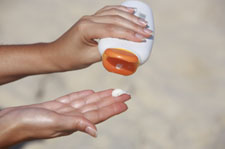The Best Sunscreen for Antiaging Skin Protection
Finding the best sunscreen is really a matter of doing a little research, to understand what natural sunscreen products are, and why for instance a zinc oxide sunscreen is preferable to one made with titanium oxide.
Two Kinds of Sun Block
- Physical: contains fine particles of minerals like zinc oxide, iron oxide, or titanium oxide which actually form a physical barrier to block ultraviolet rays from penetrating the skin
- advantages: the skin stays cool and is not irritated
- disadvantages: these leave a residue on the skin
- Chemical: contains synthetic compounds like paba, parsol, or benzophenones that penetrate the skin and absorb ultraviolet rays
- advantages:they can protect the deeper layers of skin against ultraviolet rays
- disadvantages: they can cause irritation, allergic reactions, and free produce free radicals
In a study by Norwegian scientists, ingredient in 90% of sunscreens called Octyl methoxycinnamate(OMC), was found to kill mouse cells even at low doses. In light of this you would be advised to avoid sunscreens using this chemical
Protection Factors (SPF)
Protection factors or SPF for short is a rating system to determine the best sunscreen. It tells you how long a sunscreen will protect you from the suns ultraviolet rays before you are at risk for overexposure and possible sunburn.

The SPF is a laboratory rated measurement comparing the maximum exposure times with and without a sunscreen that it would take to cause sunburn. Lets establish some rules for what these numbers mean and how you use them to pick the best sunscreen.
There are several factors that will affect this measurement:
- Your skin type
- How much sunscreen you used and how often you reapply it
- Activities that might cause the sunscreen to come off
- The amount of sunscreen your skin has actually absorbed
Thus the SPF is really a guideline and not a guarantee that one product is better than another. However, the best quality sunscreens will be a zinc oxide sunscreen and also be formulated as a natural sunscreen.
A sunscreen with an SPF of 15 will filter out 93% of the suns ultraviolet light, and a sunscreen with an SPF of 30 will filter out 97%, so one is not twice as effective as the other. Sunscreen must be applied 25-30 minutes prior to sun exposure to allow the product to be absorbed by the skin for maximum effectiveness and protection.
In reality anything over an SPF factor of 30 does not confer additional protection. Even the best sunscreen will not block 100% of the UV light from the sun, so effective protection from a practical standpoint tops out at and SPF of 30.
Make sure you reapply the sunscreen after two hours of exposure, OR if sweating, swimming, or toweling off has removed it from your skin.

Sunscreen Use and Vitamin-D Deficiency
There is some well-founded concern that use of sunscreens could suppress the synthesis of vitamin-d by the skin and lead to a deficiency in the user. This makes logical sense and thus you should not only use the best sunscreen in terms of effectiveness, and lack of toxicity, but also use it only when necessary.
I would recommend that you use sunscreens when you are not able to limit your exposure. When you have to be out in the sun for a prolonged period of time and will likely get burned, then use a zinc oxide sunscreen that is also a natural sunscreen.
When you are in a position to gradually adapt to sun exposure for short periods of time without a sunscreen then you should strive to do so. You should strive for one hour of daily sun exposure, but of course use common sense when doing it.
In this case appropriate clothing will protect you from too much sun exposure, but at the same time allow you to receive enough sunlight for your body to synthesize the vitamin-d that it needs for optimal health.
The Skin Cancer and Fatty Acid Connection
Some recent research on skin cancer and fatty acids has implicated imbalances between omega 6 and omega 3 fatty acid intakes as a contributing factor in skin cancer. Thus rich sources of omega three fatty acids like fish oil should be included in your diet to protect against skin cancer.
Proper fatty acid metabolism is critical to health; so do not focus only on the danger of over exposure to the sun, and neglect proper nutrition. Fresh fruits and vegetables are also important for the antioxidants that protect you against free radical damage from the sun.
A Few Things to Remember
Remember these general guidelines when choosing the best sunscreen and managing your sun exposure.
Once again, common sense should reign. Sunlight is natural and necessary for human beings, but underexposure to sunlight can be almost as bad as overexposure. The best sunscreen is one that is used only when necessary to prevent burns and skin damage.
Return from Best Sunscreen to Skin Antiaging
Return from Best Sunscreen to Longevity and Antiaging Secrets
New! Comments
Care to comment? Feel free to leave your comments below!